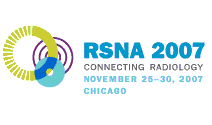
Abstract Archives of the RSNA, 2007
Nirav S. Kapadia, Presenter: Nothing to Disclose
Hong Song PhD, Abstract Co-Author: Nothing to Disclose
Shingo Baba MD, PhD, Abstract Co-Author: Nothing to Disclose
Richard L. Wahl MD, Abstract Co-Author: Research grant, General Electric Company
Speaker, General Electric Company
Speaker, GlaxoSmithKline plc
License agreement, GlaxoSmithKline plc
License agreement, Biogen Idec Inc
Scientific Advisor, Cellectar, LLC
Scientific Advisor, Actinium Pharmaceuticals, Inc
Consultant, Cellectar, LLC
Consultant, Nihon Medi-Physics Co, Ltd
Stockholder, Threshold Pharmaceuticals, Inc
Speaker, PETNET Solutions
To label anti-CD20 Mabs with 213Bi and determine the immunoreactivity and therapeutic efficacy of the labeled Mab against human Raji B-cell lymphoma cells, in vitro.
225-Ac was loaded onto a column generator and washed with HI to elute 213-Bi. The labeling reaction was performed with Rituximab conjugated to CHX-DTPA at a pH of 4.5 for 8 minutes before removing free Bi via Sephadex purification. A minimal dose of Bi-labeled antibody was applied to serial CD20+ cell dilutions approaching infinite antigen excess to determine immunoreactivity according to a method previously described by Lindmo et al. To evaluate in vitro efficacy, 5x10^5 luciferase-transfected Raji cells/ml were aliquotted into a 24-well plate. The following groups were setup: no-treatment controls, free Bi (at 20uCi, 10uCi, or 2uCi/ml), and 213-Bi-anti-CD20 (at 20uCi, 10uCi, or 2uCi/ml), half of which received 24 hours of Rituximab (20ug/ml) prior to Bi-exposure. 24 hours after Bi exposure, cells were transferred to 10ml of RPMI in T-25 flasks and counted via a luciferase assay for six days. All experiments were performed in quadruplicate.
Bi-213 labeled antibody was prepared to 98% purity, with a 40% immunoreactive fraction. Six days after Bi-dosing, the following groups showed net-negative growth: 20uCi 213-Bi-anti-CD20 (irrespective of Rituximab pre-incubation), 10uCi 213-Bi-anti-CD20 (non–preincubated samples only), and free 213-Bi (20uCi and 10uCi). 2uCi of free bismuth decreased overall cell viability by 57%. 24 hours of preincubation with unlabeled Rituximab completely abrogated the efficacy of subsequently administered 10uCi Bi-labled anti-CD20, and decreased the observed efficacy of 2uCi Bi-anti-CD20 from 95% to 36%.
We labeled anti-CD20 with 213-Bi and maintained immunoreactivity. In vitro efficacy of 213-Bi-anti-CD20 at various doses was demonstrated as was the competitive inhibition by unlabeled anti-CD20. Thus, the labeled antibody we produced is selective in its effects against CD20+ tumor cells.
Alpha-emitting radionuclides attached to Mabs are a highly lethal and specific immunotherapeutic agent and hold great potential in managing micrometastatic disease burden.
Kapadia, N,
Song, H,
Baba, S,
Wahl, R,
Synthesis and in Vitro Evaluation of Anti-CD20 Monoclonal Antibodies Labeled with the Alpha-Emitting Radionuclide Bismuth-213 for Therapy of B-Cell Malignancies. Radiological Society of North America 2007 Scientific Assembly and Annual Meeting, November 25 - November 30, 2007 ,Chicago IL.
http://archive.rsna.org/2007/5014643.html

